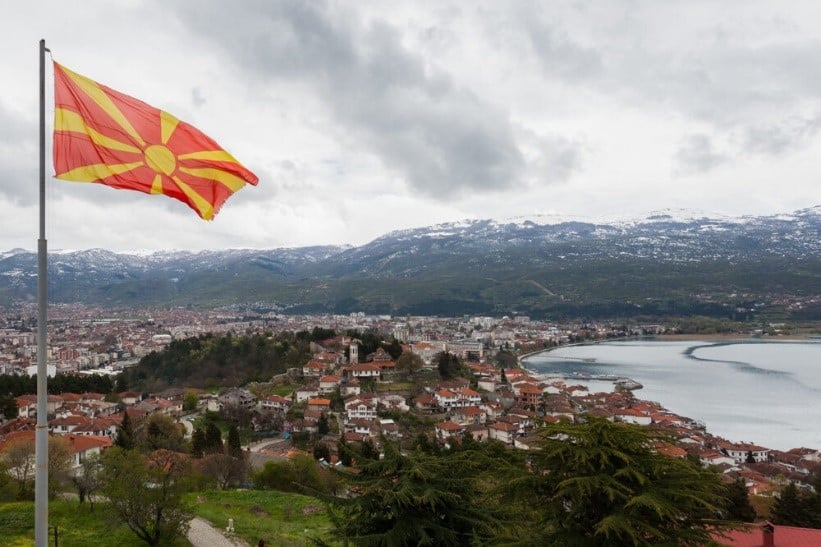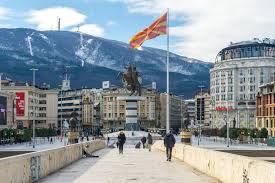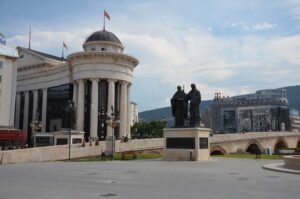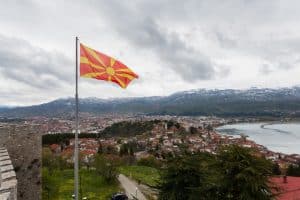After a turbulent week – including chaotic scenes at the Bulgarian border and an attack on a Bulgarian activist – North Macedonia’s longstanding aim of EU-accession seems to be up for further delay. Meanwhile, President Pendarovski’s social democratic government has to deal with anti-Bulgarian protests and resolve domestic corruption issues.
Last Saturday, Bulgarians wishing to enter North Macedonia for the commemoration of Goce Delchev – an anti-Ottoman revolutionary claimed by both North Macedonia and Bulgaria – were delayed by border police. The chaotic scenes at the border further increased tension between the two countries, after an activist of the ethnic Bulgarian minority in North Macedonia was attacked over his ethnicity a few days before.
“North Macedonia must understand that the path to Europe and to healthy neighbourly relations goes through actions, not just words”, Bulgaria’s interim Interior Minister Ivan Demerdzhiev disclosed on Monday. He was joined by former Prime Minister Ivan Kostov: “Blocking the border, making secret lists of who can enter – that isn’t an attitude that can exist in the European community”. A Bulgarian MP even went so far to speak of an “Anti-Bulgarian campaign” in North Macedonia and warned that this would prevent its EU-accession.
Shared and contested history
Ever since North Macedonia’s official application in 2004, its EU-accession has been causing headaches to subsequent governments of the Western Balkan tate. While Greece proved to be an initial obstacle, Bulgaria has been demanding concessions from Skopje in recent years. The areas of dispute? Its name and language.
That’s right: in 2018 the Former Yugoslavian Republic of Macedonia agreed with Greece to change its name to the Republic of North Macedonia. The name change was unconditional to Greece, as a serious amount of Greek people views itself as Macedonian and disapproved the use of ‘Greek’ symbols – like Alexander the Great – by their neighbor state. North Macedonia’s path to accession seemed to be open.
Soon, however, Bulgaria decided to adopt Greek tactics and use its veto as leverage. Sofia claims that the language spoken in North Macedonia is a Bulgarian dialect and demands that this will be included in the North Macedonian constitution. “What has happened now is a serious problem and a serious blow to the credibility of the EU”, North Macedonian Prime Minister Kovacevski said frustratedly after accession was blocked again by Bulgaria in 2020.
While the North Macedonian government is willing to seek compromise – a deal was agreed upon in 2019 under French mediation in which Bulgaria’s demands were met – Bulgaria’s political instability is not helpful to the situation. In April, there will be elections in Bulgaria for the fifth time in two years. Should a Eurosceptic or nationalist party win, the agreement could be vetoed at any moment in the accession process. An announcement on the 10th of February by the US and UK sanctioning several pro-Russian politicians will only further worry Skopje.
Internal protests
Cause for even more concern is the domestic support for the deal with Bulgaria. President Pendarovski’s government is struggling to gather enough parliamentary votes to change the constitution, as the deal requires. As a consequence, the Alliance of Albanians Party has joined the government from the opposition.
VMRO DPMNE – a Christian-Democratic opposition party – sees the Bulgarian deal as a denial of North Macedonian identity and has organized several protests against its adoption. The Bulgarian deal, therefore, puts the position of the governing social-democratic SDSM party at risk. An uncomfortable reality for Pendarovski and Kovacevski, as the next parliamentary elections – to be held in 2024 – are edging closer.
Corruption issues
Besides the approval of all EU member states, North Macedonia will have to meet certain requirements – known as the ‘Copenhagen criteria’ – regarding the state of its democracy, rule of law, and economy.
In 2015, the vulnerability of North Macedonia’s democracy to corruption was revealed by a high-profile wiretapping scandal involving the government and public prosecutors. While the government was toppled and those responsible were effectively punished, in 2020 researchers concluded that an alarming 70% of North Macedonians distrusts politics, courts, and public prosecution.
Despite these issues, North Macedonia has made a significant effort in adopting EU related reforms. This resulted in an overall positive report by the European Commission in 2021, mentioning the “clear recognition of the determination of North Macedonia to implement EU related reforms”. Although more work needs to be done in the areas of transparency, electoral process and judicial system Skopje seems to be on its way to fulfilling the Copenhagen criteria.
Although North Macedonia is not lacking determination, its road to EU-accession continues to be uncertain. Cooperation with Greek and Bulgarian demands has resulted in growing domestic dissatisfaction with the “denial of North Macedonian identity”. Meanwhile, politically unstable Bulgaria seems to grow impatient with Skopje’s unsuccessful attempts at adopting parts of the 2019 agreement. Accession to the EU is likely to remain a difficult issue for North Macedonia in the near future.
Author: David Groenen



